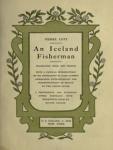Part 2 - In The Breton Land
Chapter 12 - Striking The Rock Unknown
The sea, the gray sea once more, where Yann was gently gliding along its broad, trackless road, that leads the fishermen every year to the Land of Ice.
The day before, when they all had set off to the music of the old hymns, there blew a brisk breeze from the south, and all the ships with their outspread sails had dispersed like so many gulls; but that breeze had suddenly subsided, and speed had diminished; great fog-banks covered the watery surface.
Yann was perhaps quieter than usual. He said that the weather was too calm, and appeared to excite himself, as if he would drive away some care that weighed upon him. But he had nothing to do but be carried serenely in the midst of serene things; only to breathe and let himself live. On looking out, only the deep gray masses around could be seen; on listening, only silence.
Suddenly there was an almost imperceptible rumbling, which came from below, accompanied by a grinding sensation, as when a brake comes hard down on carriage wheels. The Marie ceased all movement. They had struck. Where, and on what? Some bank off the English coast probably. For since overnight they had been able to see nothing, with those curtains of mist.
The men ran and rushed about, their bustle contrasting strongly with the sudden rigidity of their ship. How had the Marie come to a stop in that spot? In the midst of that immensity of fluid in this dull weather, seeming to be almost without consistence, she had been seized by some resistless immovable power hidden beneath the waves; she was tight in its grasp, and might perish there.
Who has not seen poor birds caught by their feet in the lime? At first they can scarcely believe they are caught; it changes nothing in their aspect; but they soon are sure that they are held fast, and in danger of never getting free again. And when they struggle to get free, and the sticky stuff soils their wings and heads, they gradually assume that pitiful look of a dumb creature in distress, about to die. Such was the case with the Marie. At first it did not seem much to be concerned about; she certainly was careened a little on one side, but it was broad morning, and the weather was fair and calm; one had to know such things by experience to become uneasy, and understand that it was a serious matter.
The captain was to be pitied. It was his fault, as he had not understood exactly where they were. He wrung his hands, saying: "God help us! God help us!" in a voice of despair.
Close to them, during a lifting of the fog, they could distinguish a headland, but not recognize it. But the mists covered it anew, and they saw it no longer.
There was no sail or smoke in sight. They all jostled about, hurrying and knocking the deck lumber over. Their dog Turc, who did not usually mind the movement of the sea, was greatly affected too by this incident, these sounds from down below, these heavy wallowings when the low swell passed under, and the sudden calm that afterwards followed; he understood that all this was unusual, and hid himself away in corners, with his tail between his legs. They got out the boats to carry the kedges and set them firm, and tried to row her out of it by uniting all their forces together upon the tow-lines—a heavy piece of work this, which lasted ten successive hours. So, when evening came, the poor bark, which had only that morning been so fresh and light, looked almost swamped, fouled, and good for nothing. She had fought hard, floundered about on all sides, but still remained there, fixed as in a dock.
Night was overtaking them; the wind and the waves were rising; things were growing worse, when, all of a sudden, towards six o'clock, they were let go clear, and could be off again, tearing asunder the tow-lines, which they had left to keep her head steady. The men wept, rushing about like madmen, cheering from stem to stern—"We're afloat, boys!"
They were afloat, with a joy that cannot be described; what it was to feel themselves going forwards on a buoyant craft again, instead of on the semi-wreck it was before, none but a seaman feels, and few of them can tell.
Yann's sadness had disappeared too. Like his ship, he became lively once more, cured by the healthy manual labour; he had found his reckless look again, and had thrown off his glum thoughts.
Next morning, when the kedges were fished up, the Marie went on her way to Iceland, and Yann's heart, to all appearance, was as free as in his early years.
